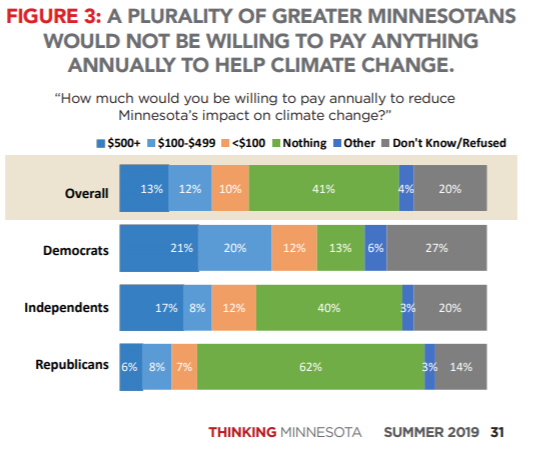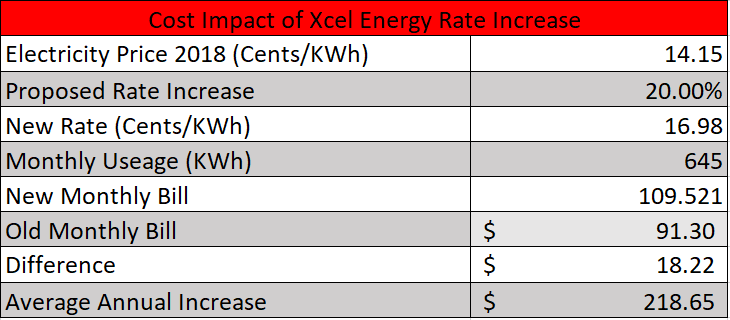MNCEF Releases Another Shoddy Pressure Poll
Another day, another pressure poll from the Minnesota Conservative Energy Forum, or MNCEF.
If you’re not familiar with MNCEF, I encourage you to read this series to learn how the organization gets the vast majority of its funding from the ultra-liberal Energy Foundation, which also funds the Sierra Club, how they advocate for energy sources that increase your electric bill, and how these energy sources undermine our national security.
Now, back to the pressure polling.
MNCEF doesn’t do any real research, but they do try to pressure lawmakers into adopting liberal energy policies that pave the way for more wind and solar by producing push polls meant to scare conservative and moderate Republicans into supporting them. The message typically goes: “Vote for more wind and solar or face the wrath of voters in the next election.”
Unfortunately, this pressure polling is more effective than you would hope, which is why it is important that we help busy legislators understand what this poll is and is not saying.
[embeddoc url=”https://files.americanexperiment.org/wp-content/uploads/2021/01/MNCEF-Push-Poll-1-14-21.pdf” viewer=”google”]
Question One: “How important is it to you that a candidate for political office share your opinion on issues relating to clean energy?”
What this actually tells us: Not much!
MNCEF says 81 percent of people surveyed said it was either very important or somewhat important that their candidate for political office share their opinion on clean energy issues. But the way this question is worded makes it impossible to know how the respondent actually feels about anything!
It is equally possible that someone could want their political candidate to be vehemently opposed or in favor of wind and solar, based on how the question was worded. Why would they even bother asking, much less publishing, the results of such a meaningless question? Embarrassing!
Question Two: “Would you support or oppose the government taking action to accelerate the development and use of clean energy in the United States?”
What this actually tells us: People are generally supportive of “clean energy” in a vacuum.
Now we’re getting somewhere, and this question starts to uncover some meaningful information. MNCEF says 40 percent of respondents strongly supported the government taking action to accelerate the development of “clean energy” in the United States, and 27 percent somewhat supported it.
These answers aren’t surprising because American Experiment’s own polling has found that people have favorable views of wind and solar if they are asked about them in a vacuum. However, support for these policies drops significantly when people are asked about potential costs and other tradeoffs.
Remember, there is no such thing as a free lunch, and the most-informative poll questions ask people how they feel when considering the costs and the benefits of a given policy. That is why American Experiment asked our poll respondents how much they would be willing to pay each year to reduce Minnesota’s impact on climate change.
Our results found 41 percent of people living in Greater Minnesota were unwilling to pay anything at all. This included 13 percent of Democrats, 40 percent of Independents, and 62 percent of Republicans. Only 10 percent of respondents were willing to pay $100 per year or $8.33 per month.

This means even $10 per month is more than what 51 percent of people living in Greater Minnesota are willing to pay to increase wind and solar use for electricity generation. Unfortunately, $10 per month is a bargain compared to the costs of proposals supported by Governor Walz and Xcel Energy.
American Experiment’s award-winning research found that a 50 percent renewable energy mandate, which is half of what Governor Walz wants to mandate in Minnesota, would cost each Minnesota household an average of $1,200 per year, every year, through 2050. Remember, only 13 percent of our respondents were willing to pay more than $500 per year to reduce Minnesota’s impact on climate change. Everyone else said this cost was too high.
Xcel Energy is already proposing a 20 percent increase in electricity prices to pay for spending on wind and solar facilities. This increase would cost the average family in Xcel’s service territory nearly $220 per year! Only 25 percent of voters in Greater Minnesota would be willing to pay this price, and only 14 percent of Republicans would be willing to pay this cost.

It is important for lawmakers to know that Xcel’s 20 percent increase is just the tip of the iceberg, and the companies plan to shut down their coal plants and build massive amounts of wind, solar, and natural gas plants will cost the average Xcel customer $1,428 per year, every year, through 2051!
Question 3: Which approach would you prefer to increase clean energy production? Market and business approaches, or government mandates and quotas?
What this actually tells us: Most people don’t support the energy policies MNCEF is trying to scare lawmakers into passing!
According to MNCEF, 70 percent of people support market and business approaches to increase clean energy production, with only 25 percent favoring government mandates and quotas.
The interesting thing here is that MNCEF is championing the Clean Energy First bill, which is a set of government regulations forcing utility companies to build wind and solar! How is the government telling businesses what kind of power plants they can build not a government mandate or quota?
American Experiment has detailed why Clean Energy First is bad policy. It has no firm protections for Minnesota families and businesses to protect them from rising prices, which means this legislation would make it much easier for Xcel to increases costs for Minnesota customers by $1,400 per year.
Conclusion
MNCEF will be going door-to-door, or Zoom-meeting-to-Zoom-meeting, with the results of this poll in the coming days and weeks in an attempt to pressure Republican lawmakers into supporting Clean Energy First and other policies that increase electricity prices for Minnesota families. It is essential that you and your legislator know what this poll actually means, so they can keep cool under pressure and kindly disregard this pressure polling.